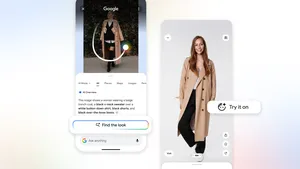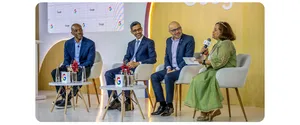Honoring the legacy of Black-owned businesses in the U.S.
In this post: This Black History Month, we’re highlighting Black-owned businesses and showing our support through funding and training.
In 1946, Irene and Clint Cleaves opened The Four Way Grill with a simple mission: Serve the best soul food in all of Memphis. And for the last 75 years, they’ve done just that and more. In its early days, The Four Way was one of the few places where Black and white diners sat together, and it was considered a safe haven for leaders of the civil rights movement to recharge and enjoy a good meal. And today under the stewardship of the Bates family, The Four Way Restaurant remains a cornerstone of the Memphis community and symbol of Black American history.
Historically, Black-owned businesses have served as gathering spots for Black communities throughout the country and provided a strong sense of ownership and belonging for those who were denied equal rights. And today, as more Black businesses come online, they’re creating new pathways for economic opportunity and generational wealth in the Black community. As we kick off the first day of Black History Month, we want to shine a light on Black-owned businesses, big and small, and honor their resilience and ingenuity.
Making it easier to find and support Black businesses
In the past 12 months, Google search interest for “black owned businesses” has skyrocketed 600% based on Google Trends data comparing January-December 2019 to January-December 2020. Across the country, people have been looking for “black owned restaurants,” “black owned bookstores,” “black owned beauty supply” and more, which speaks to the diversity within the Black business community. We want to make it easier for people to support and spend dollars with the Black businesses they love. Starting today, we’re extending the Black-owned attribute to Google’s Shopping tab, so people can easily identify and buy from Black-owned businesses on Google. Business owners can add the Black-owned attribute by visiting the Google Merchant Help Center. The feature will become visible to shoppers and available to all U.S. Google Merchants in coming months. This update builds on the Black-owned business attribute we launched across Google Search and Maps last summer and is another way people can shop with Black businesses across Google’s products and platforms.
The Black-owned business attribute on Google’s Shopping tab.

Funding organizations that support the Black small business community
Reports have shown that 41% of Black-owned businesses — about 440,000 businesses — have been shuttered due to COVID-19. Through our partnership with Opportunity Finance Network (OFN), over $30 million in loans and Google.org grants to support Black-owned businesses and community lenders have been distributed to local organizations; that’s out of the $50 million we committed through the Grow with Google Small Business Fund announced back in June. We also provided a $5 million Google.org grant to Common Future, which through its network, has distributed the funding to community organizations supporting women and minority small business owners throughout the U.S. and is providing technical assistance and coaching to businesses. Click through to meet some of the Black-owned small businesses and community-centered organizations that have received funding.
Harriett Williams and Donte Miller are co-Founders of the Village Micro Fund, which is a social impact fund dedicated to empowering entrepreneurs in Metro Atlanta, GA. The Village Micro Fund works to fill the access gaps in financing, education, technical assistance, and cooperative development for small black and brown businesses and prove that under-resourced communities around the country can self direct the development of their neighborhoods. The Village Micro Fund received funding from Common Future, with support from Google.org. (Photo by Adrianna Clark)
JC Smith and Jeff Smith launched Bailiwick Clothing Company to represent and elevate the pride and positive energy of the District of Columbia. Facing unprecedented challenges in the face of COVID-19, the brothers turned to Washington Area Community Investment Fund (Wacif) for financing and technical assistance, with support from the Grow with Google Small Business Fund and Google.org.
Sheila owns mobile boutique Liha on 125th Street in Harlem next to the iconic Apollo Theater. When COVID-19 hit New York City in March, Sheila had to shut down her store due to social distancing mandates and quickly pivoted her business online with financing and technical assistance from Grameen America, with support from the Grow with Google Small Business Fund and Google.org.
Jessica Norwood is the CEO of RUNWAY, a national financial innovation firm that advances resiliency for Black businesses and the communities they serve by building emergent financial practices and infrastructure that closes the racial wealth gap for good. RUNWAY provides Black, Indigenous, and People of Color (BIPOC) entrepreneurs with early-stage “We believe in you” funding and holistic business support in order to bridge the racial wealth gap for African-Americans and their local communities. RUNWAY received funding from Common Future, with support from Google.org. (Photo by Toni Riales)
Tim Lampkin is the CEO of Higher Purpose Co. (HPC), an economic justice nonprofit working to build community wealth with Black residents in Mississippi by supporting the ownership of financial, cultural, and political power. By using a solutions-based organizing and community wealth building approach, HPC unapologetically tackles the generational poverty, structured inequality, and institutional racism in Mississippi. Higher Purpose received funding from Common Future, with support from Google.org. (Photo by Trent Calvin Photography)
Jennie L. Stephens is the CEO of the Center for Heirs Property Preservation, which is a non-profit that helps families protect and keep their family land, build generational wealth and grow working landscape. The Center for Heirs’ Property Preservation protects heirs’ property and promotes the sustainable use of land to provide increased economic benefit to historically underserved landowners. The Center for Heirs Property Preservation received funding from Common Future, with support from Google.org.
In addition to financial support, Google recently expanded the Grow with Google Digital Coaches program to 20 cities across the U.S. in order to provide 50,000 additional Black-owned businesses with mentorship, networking and training they need to grow. To date, Digital Coaches have helped train over 58,000 Black and Latino small business owners through more than 1,000 digital skills workshops. Throughout Black History Month, our Digital Coaches will host tailored digital skills workshops for Black business owners in their communities.
These events will culminate in a virtual, national Black Small Business Meetup on February 25 with free workshops, panels and best-practice sharing for more than 500 Black small business owners, entrepreneurs and leaders from across the country. Sign up to attend the free virtual summit at our event website.
Black businesses are critical to the growth and recovery of the U.S. economy. It’s imperative that we support and invest in Black business owners, especially as the COVID-19 pandemic is forcing many of their businesses to close. Black-owned businesses have a rich legacy of community and activism, and it's our collective responsibility to ensure that their legacy continues to thrive for generations to come.






